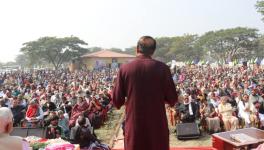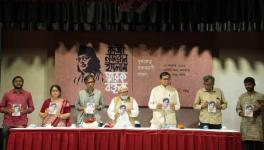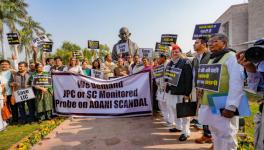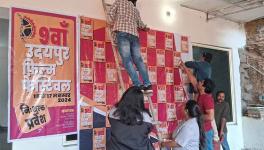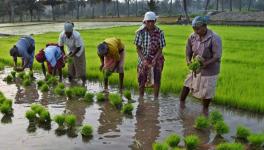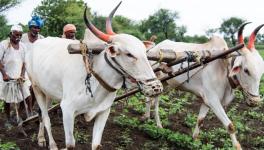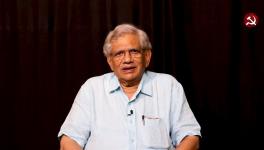Sikar: No Longer Just a Farmers’ Movement, But a People’s Movement for Farmers

Farmers in Sikar conduct a mock funeral of the Vasundhara Raje-led BJP government of Rajasthan
The Sikar district of Rajasthan has seen various mass movements in different times in the past. But nothing like what is happening today. Unlike many other cases where the middle class starts complaining whenever there is a mass agitation, this farmers’ movement, with its eleven genuine demands, has gathered huge support from the people of the region and even from the media.

The movement has stopped being just a farmers’ movement and has become a people’s movement for the farmers.
Here is a brief chronological summary of the inspiring, and peaceful, movement in Sikar, based on what we saw and the information we have collected.
16 June 2017 – The All India Kisan Sabha called for a meeting at Sikar’s Krishi Upaj Mandi where they talked about the crisis faced by the farmers in Rajasthan. They discussed and planned their future course of action. After the meeting, Amra Ram, mass leader and ex-MLA from the CPI(M), gave a call for a “Kisan Curfew” a month later, on 17th July.
Campaigns started across Sikar district by the Kisan Sabha, under the leadership of Amra Ram and Pema Ram, another popular leader. They covered the whole district, with more than a thousand villages and about 343 Panchayats.
17 July – A month after the first meeting at the Krishi Upaj Mandi, Sikar saw a successful curfew from 8 am till noon by the farmers. They had created some 40 gathering points to implement the curfew. They called it “Kisan chawki”, in a mock imitation of the police chawki since a curfew is usually called by the administration and implemented through police chawkis. The aim of this curfew was to do a “chakka jam”, to prevent government officers from travelling.
During this curfew, Amra Ram and Pema Ram after talking to the farmers declared that the government will have 10 days to talk to them. If the government refuses to talk, the agitation would be intensified, and the further course of action would be declared on 27th July.
27 July – The State Committee of the Kisan Sabha met at Krishi Upaj Mandi to decide on the further course of action. They declared that on 9th August, farmers across Rajasthan would court mass arrest at their local Tehsil headquarters.
After this decision, a massive campaign was carried out across the state for 13 days.
9 August – Farmers across the state voluntarily went for mass arrests. More than a thousand farmers in Sikar courted mass arrest.

The leaders continued meeting the farmers to chalk out the future line of action.
18 August – Kisan Sabha’s State Committee met again at Krishi Upaj Mandi and decided to intensify the movement further. They gave a call for the “Mahapadav” (sit-in). They declared that from 1st September, farmers would do a mahapadav at their district headquarters across the state.
Another set of campaigns started across the state. There was a difference, however. Till now the campaigns of the movement were led by Amra Ram and Pema Ram, but this campaign was taken over by the village committees of the Kisan Sabha. Kisan Sabha members went to all villages and all houses. They collected money and wheat from people. They received generos help from all the villages. Local village leaders from other parties and other organisations also pitched in. “Har kooen se gehoon ka ek pipa mila” (literally - “we received a box of wheat for each well”).
1 September – Farmers riding their tractors started pouring into Sikar’s Krishi Upaj Mandi, along with food and other essential stuff. They arranged for their stay under the tin shed at the mandi. Around 15,000 farmers peacefully marched towards the Collectorate office and gave their charter of demands – addressed to CM Vasundhra Raje – to the district collector. They returned to the krishi mandi and started camping there.
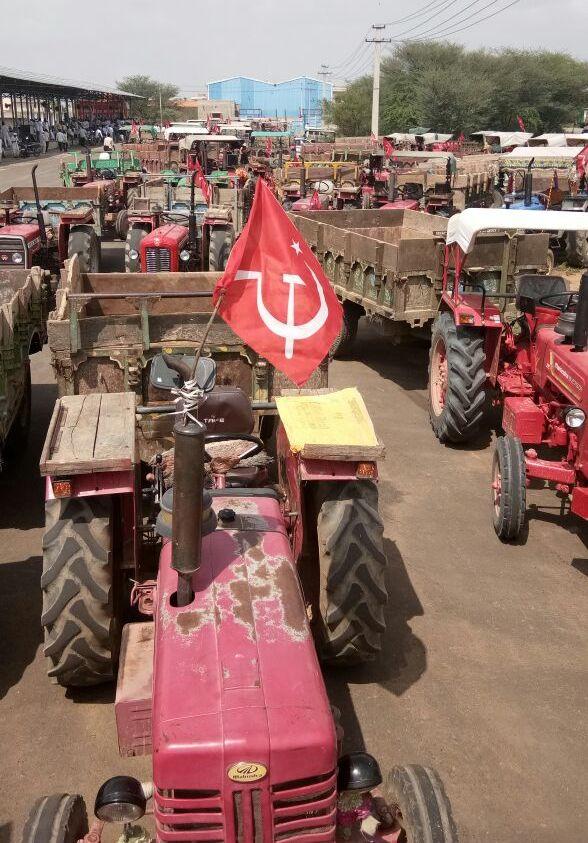
Amra Ram made an open appeal to all organisations and parties to come and stand in support of the farmers. This was not a partisan fight, he said.
2 September – The routine at Krishi Upaj Mandi started taking shape. From 11:30 am, a public meeting –“aam sabha” – would start. Leaders of the farmers would address the gathered farmers. The aam sabha would continue till 5 pm, following which they would hold many smaller meetings in the camps in a disciplined manner, in order to take input from all the farmers. The planning got more decentralized and the farmers directly started deciding the further course of action. The day following the smaller meetings, the plans discussed at such meetings would be discussed in the aam sabha.
The farmers planned and executed a peaceful march to the Collector’s residence at 9 pm. They marched to “disrupt the peaceful slumber of the administration” (“Prashasan ki neend haram karne ke liye”). The police tried to disrupt the night vigil by directing ambulances and other vehicles through the rally, while there was a whole other route available. So peaceful was this vigil that within minutes following a call by their leader Amra Ram, thousands of farmers made space for the ambulance and vehicles to pass. They told us that they just wanted to wake up the administration, not to disturb people. People of the city and local media were full of praises for the movement the next day.
3 September – Apart from the aam sabha and meeting, the farmers held a kavi sammelan for some entertainment. They also decided to take out a shav yatra (funeral procession) of Vasundhara Raje the next day.
For around two hours that night the farmers called up people in the villages for mobilisation.
4 September – Lakhs of farmers, including more than 10,000 women dressed in traditional red saris, took out a funeral procession of the Vasundhara Raje-led BJP government. So huge was this rally that the people and the media said that they have never encountered such a remarkable, yet peaceful rally in their lives.
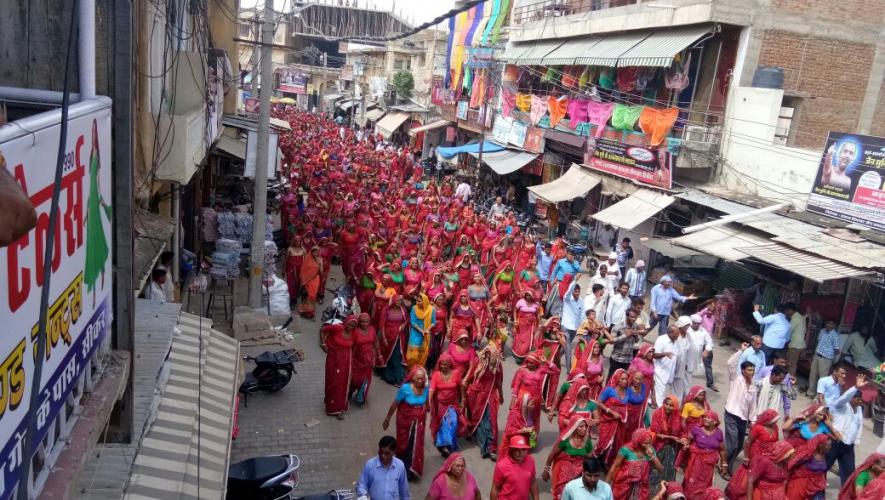
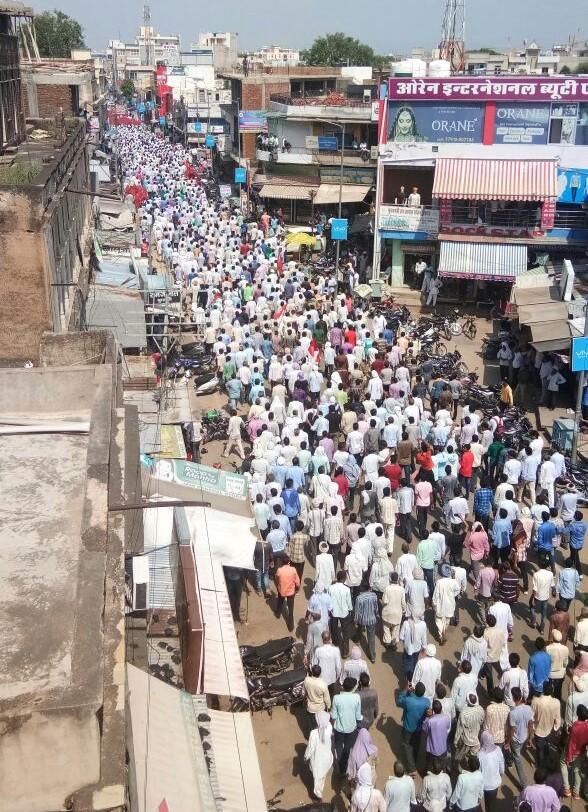
Businessmen, traders and other sections, moved by the movement, began to join in solidarity with the farmers. It was no more just a farmers’ agitation. “Uske baad ye jan andolan ban gaya” (“it became a people’s movement”).
5 September – Other organisations, unions and mass fronts began to pitch in with financial aid. The union of the kiln brick makers joined with more than 500 tractors and trolleys.
6 September – Businessmen and traders started arranging for the food of the farmers staying at the Krishi Upaj Mandi. (From then till now, the food is being arranged by different people from the business community, and the filter water providers union has been providing free drinking water tankers.) They announced that they would shut down businesses the next day in solidarity with the farmers. Milk transportation unions came to the mandi and declared that they would stop providing milk to everyone from the day the farmers ask them to do so.
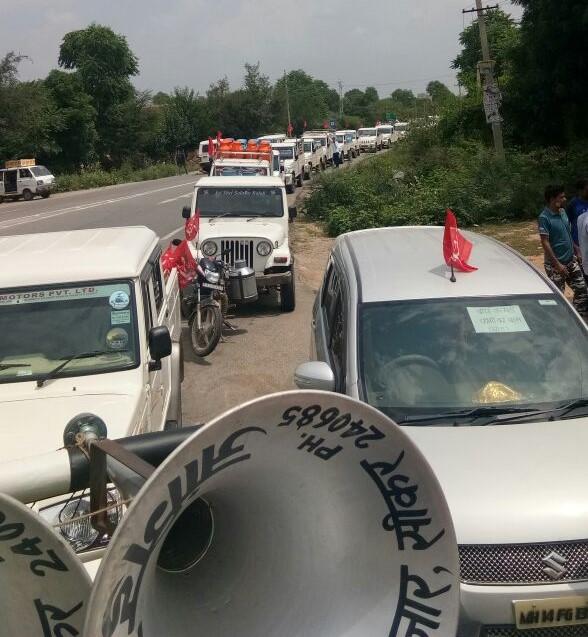
At night, around 8:30, the farmers took out a peaceful and massive Mashaal Juloos (Torchlight Procession).
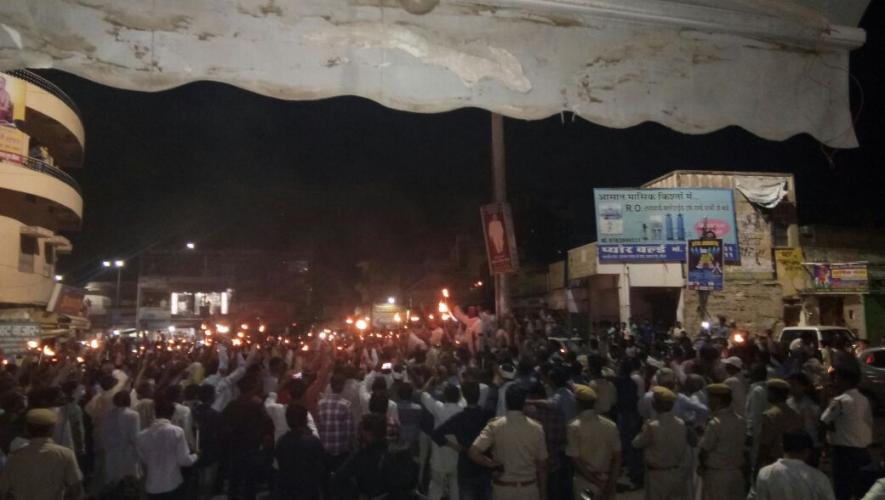
7 September – A bandh was successfully held. The plan was to shut down Sikar city, but the traders’ solidarity went beyond the city. “Gaon, kasbe, sab band the” (“towns, villages were all shut that day”). This was spontaneous, unplanned and without any campaign or intervention by the Kisan Sabha.
The city bus union did a march in solidarity, with hundreds of buses peacefully driving down the city. The ambulance union followed, and the auto rickshaw union came later on the same day. Both the unions as well as the tempo union gave similar assurance as the milk delivery unions – that they would shut down business the day the farmers order them to.
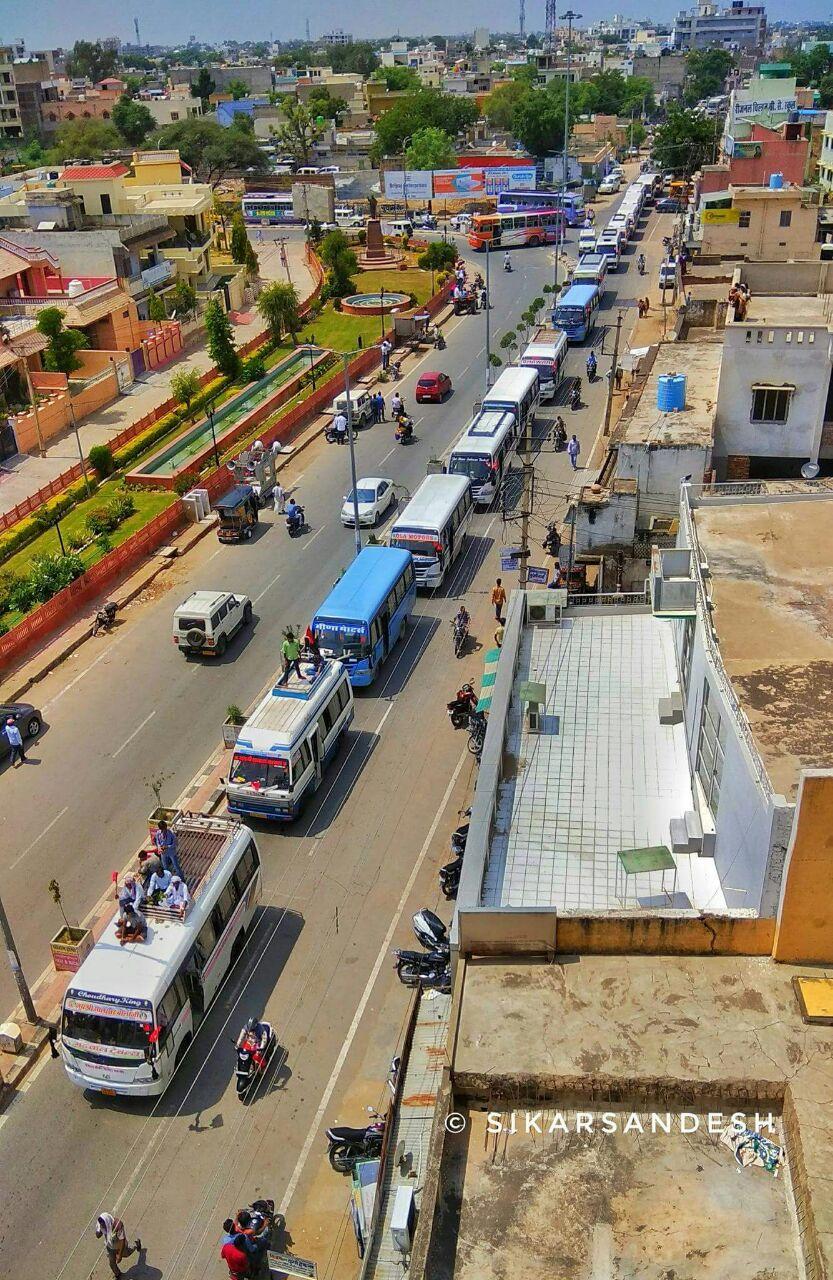

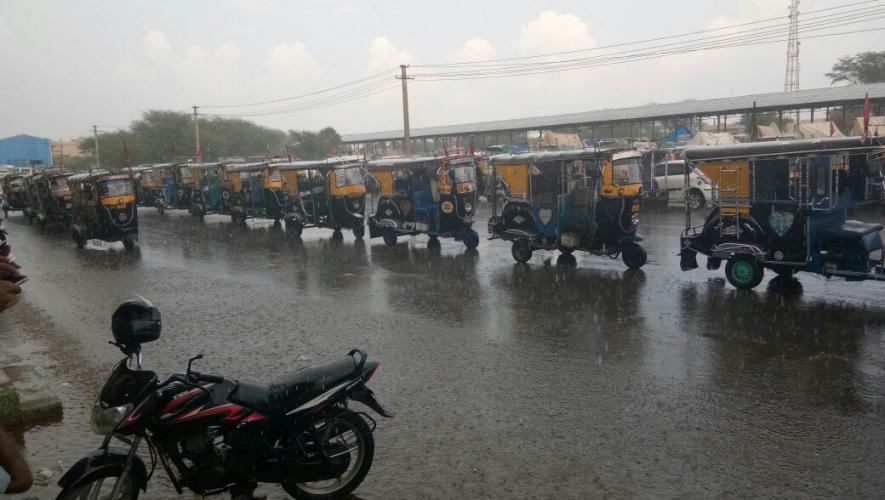
8 September – Amra Ram declared in the aam sabha that they would give two more days to the government to respond. If not, from 11th onwards, they would shut down everything. While the men would march towards the Collectorate, the women in the villages would shut down all the roads to and from their villages. “Sab kacche pakke raaste band rahenge” (“all the concrete built roads and even the unbuilt ones would be shut down”).
9 September – The Sikar DJ union, with more than 100 DJ trucks travelling through all the main roads of Sikar city, reached the krishi mandi. Songs with catchy music about Amra Ram, Pema Ram and the Kisan Sabha rocked the city. The residents from the whole city, including women, were on their terrace, tapping their feet, with a mobile phone to record this unique sight.

10 September – More than 50 organisations had by now come in support of the farmers. On the 10th day, some local politicians from other parties, seeing the success of the movement, were almost forced to show solidarity. They came to address the aam sabha.
Finally the farmers were asked to come to the Collectorate for talks the next day.
11 September – As per their leaders’ call, women shut down roads across the district. Women carrying Jeli (a pitchfork--like farming tool) gathered to execute the bandh. Some 300 points of entry and exit were identified and nodal points were created. But like last time, the people took it upon themselves and created more than a thousand unplanned block points. Women and men peacefully shut down all the points to and from their towns and villages.
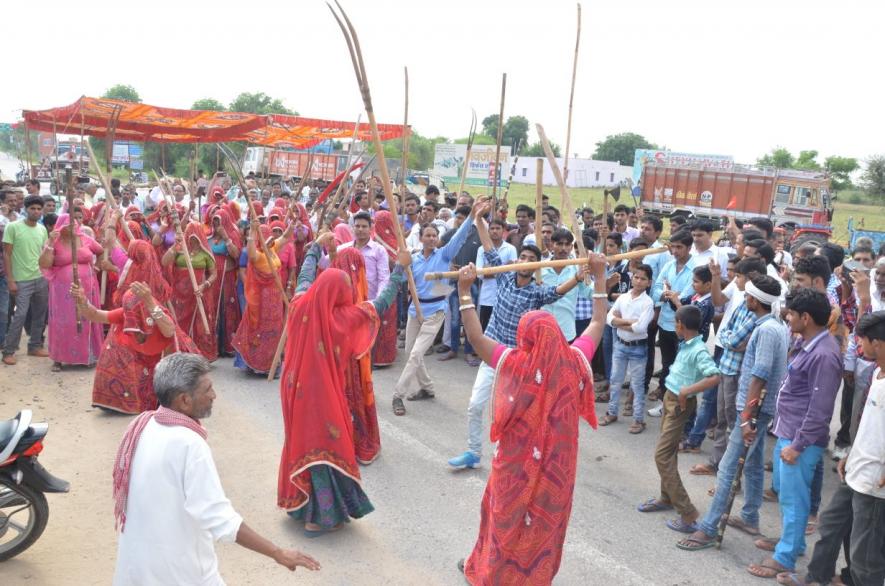
In the city, thousands of farmers left the mandi to reach the Collectorate, where they were invited for a talk. Very close to the mandi, the police had barricaded the roads.
The police was everywhere, Section 144 was imposed, and internet was shut down. The administration thought they were now ready, with the police force and water cannons in place.
But the farmers of Sikar decided to cause no disruption and shifted their temporary residences from inside the mandi to outside, just till the barricade. The number of farmers were large enough to cross the barricade and go into a confrontation. But the intent of this movement has not been that since the very beginning. The mass support it has gathered is because of the patience, restraint, and discipline that they have shown so far.
Since the administration wouldn’t talk to them, they have decided to continue the sit-in while the women have decided to continue the blockade. The farmers have been invited for talks at 5 pm on Tuesday, 12 September.

When we went to talk to the women blocking roads, we saw the remarkable success of the blockade. They are determined and full of energy: “Jab tak Sarkar karja maaf nahi karti, hum nahi uthenge” – “we won’t get up till the government gives a loan waiver”.
Here at the mandi the air is that of resistance, determination and yet a celebration of the people. Farmers have started living on the roads along with sheds. Last night, a programme with protest songs was held. Songs of protest, dances to the tunes of songs about the Kisan Sabha and the kisan movement, and their taash (free time is spent playing cards) have all been intrinsic parts of the mahapadav.
The farmers are not tired, physically or mentally. They wait with their songs, their determination, their slogans, their red flags and their taash, for a successful outcome to their agitations.
The newspapers in Rajasthan have been covering the farmers' protests extensively. Given below is a compilation of clippings from local newspapers.
P.S.: We - myself and Newsclick camera person Avinash Sourav - were to leave on Tuesday morning, but the bandh has delayed our departure from Sikar. We stand in solidarity with the movement, hoping for the success of their movement.
Get the latest reports & analysis with people's perspective on Protests, movements & deep analytical videos, discussions of the current affairs in your Telegram app. Subscribe to NewsClick's Telegram channel & get Real-Time updates on stories, as they get published on our website.









